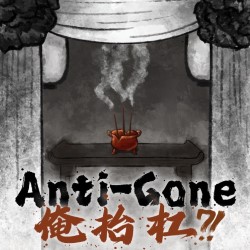Written by Yiwei Will Lu and directed by Dejing Eloise Wong, ‘Anti-Gone’ (俺抬杠?!) at the Lime Studio, Greenside, reimagines Greek tragedy within the setting of a rural Northern Chinese village during the 1980s.
Just like many retellings of Antigone, this version has the dead who will not rest, the living who will not stop quarrelling, and spirits who insist on taking part. The play unfolds entirely within the chaos of a funeral, blending humour, family issues, and a daydreaming child emperor. Siblings clash over inheritance, legacy, revolution, and the meaning of dying properly. As the day descends into disorder, ancestral spirits rise, ghosts from ancient history whisper, and even the family cow speaks.
The original Antigone has inspired countless interpretations, often centred on the individual’s right to reject society’s systemic oppression. In Sophocles’s original version, it is the conflict between human law and divine law. In Lu’s retelling, the struggle is with patriarchy, state violence, and the deep-rooted weight of Confucian tradition.
The layering of stories makes the work feel complex, almost overwhelming. A play adapted from a Greek tragedy, framed within another tale set inside a dream, recalls the ancient Chinese parable of The Butterfly Dream, where the dreamer becomes an emperor in sleep. Yet within this excess there remains a consistent drive that keeps the work moving forward. Whether the oppression falls upon women, intellectuals, or those seeking to grieve openly, whether it takes place within the state or within the family, whether forty years ago, centuries past or nowadays, the play explores the ancient system underneath it all. Confucianism, with its strict codes and hierarchies, continues to shape much of East Asian life.
The bilingual title ‘Anti-Gone’ (俺抬杠?!) carries its own richness. It evokes the Greek heroine and her defiance, while in Chinese its sound-alike phrase means ‘arguing’. At the same time, ‘anti gone’ itself suggests a refusal to forget. By weaving these layers together, the title captures the play’s heart: grief that cannot be expressed under an oppressive system, ancestral trauma passed down through generations, and the demand for discourse so that such weight may one day be lifted.
‘Anti-Gone‘ has finished its Fringe run


Comments